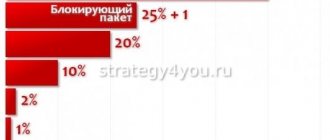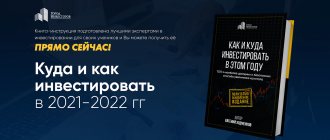Today, investing is available to everyone who has the money and time for it. People invest money in order to preserve and increase it. Successful investing is an opportunity to secure a comfortable future for yourself and spend your personal time at your own discretion. However, you cannot become a successful investor without effort, because smart investments require preparation, responsibility and a special attitude to personal finances.
Today we will tell you who a private investor is, where he invests money and what qualities you need to have to succeed in this interesting and complex business!
Who is an investor and what does he do?
Investors are direct investors: they decide where to allocate and give money (their own, borrowed or attracted) for the development of a specific object. Of course, there is also a speculative market. But the initial task is to direct the finances to their intended use.
For example, if shares of a plant are purchased, the money will be used to modernize production, develop and produce new products.
Investors can be:
- state, including foreign;
- enterprises of different forms of ownership;
- foundations and organizations;
- individuals.
Of course, there is also the stock market. But this is no longer an investment in its pure form, but speculation.
Purpose and rights of the investor
The goal of any investor is to make money on investments. Often he invests money in a project, in words and promises on paper (opening a hypermarket, for example). Another goal is to solve social problems (housing construction).
All rights of investors are regulated by law. This:
- the right to invest;
- the right to own, use and dispose of objects in a share identical to the invested funds (with reservations);
- the right to independently choose the object and the amount of investment;
- right of control (an investor who owns shares can request financial statements);
- the right to pool capital with other investors;
- the right to transfer rights and investment results (including by will), etc.
Functions
The main function of an investor, no matter how pretentious it may sound, is to stimulate economic development. Even taking into account the fact that the investor comes to the market to make money. And he tries to save on everything: from materials to wages and safety precautions. Supervisory government bodies should work here (but I’ll talk about this in another article).
In addition, the investor:
- structurally restructures and develops a separate industry;
- influences the development of scientific and technological progress (the introduction of modern technology or a complete rejection of modernization, if it is profitable to hire a crowd of unemployed people for simple monotonous work);
- expands reproduction, increases defense capability (more relevant to the investor-state);
- develops financial markets and the banking sector of the economy;
- solves environmental problems (ideally);
- increases employment;
- stimulates the rise of the social sphere (housing construction, medicine, education, sports, etc.);
- promotes international cooperation.
What is investment
Investment is an investment of capital in order to get even more money. For an investor, a good profit is in the amount that:
- initial costs returned;
- the loss from inflation was compensated;
- net profit appeared as compensation for the risk and refusal to use money for consumption.
Sometimes the purpose of investment is not considered to be material gain, but some other useful effect. For example, government investment in the economy of another country. Although the investment may not be returned, the impact on the region, cooperation and support on the international stage are worth it.
Number of private investors in different countries of the world
The global crisis has affected different countries differently. In America, the number of investors is declining: from 65% (in 2007) to 52% (in 2017) and continues to fall.
In European countries, Australia and Canada, the number of private investors is declining. If in Europe there has been an increase in population (refugees begging for benefits rather than investing), then in Australia and Canada people are more likely to choose the real sector (farming, crafts, trade).
In Japan, the popularity of private investment is growing: one way or another, more than 40% of the population consider themselves private investors.
There are few private investors in Russia (judging by the IFAC data), but the trend of interest shows stable growth.
What is an investment portfolio
An investment portfolio is the collective name for several baskets into which a wise owner puts his eggs. The investor distributes investments in different areas of financial activity:
- securities;
- real estate;
- investment gold coins, etc.
This achieves a reduced loss of capital risk and an even higher level of profit.
By the way, the total risk of an investment portfolio is often less than the risks of individual investment instruments within it.
The division of investments according to the degree of risk is very arbitrary. For example, gold has become a highly speculative instrument and is not seen as an inflation hedge.
Therefore, when forming an investment portfolio, only securities are often used. And the concepts of “investment portfolio” and “securities portfolio” are considered equivalent.
Legislative regulation of investment
Before you start investing, it’s a good idea to study the rules of the “game” - the legislation of the country. At least just to understand the capabilities of financial instruments. The main legal acts in Russia are:
- Constitution and Civil Code of the Russian Federation;
- federal laws:
- “On the securities market”;
- “On the protection of the rights and legitimate interests of investors in the securities market”;
- “On investment activities in the Russian Federation, carried out in the form of capital investments”;
- “On foreign investment in the Russian Federation”;
- “On the Central Bank (Bank of Russia).”
FAQ
I will try to answer the questions briefly and clearly.
Where do investors get their money?
Depending on your income, it is realistic to save from 10 to 30% monthly into an investment account. Thus, within a year you will form an investment portfolio that will bring additional income. Whether to withdraw it or reinvest it is up to you.
How do they know where to invest?
Beginners believe that there is free analytics. If you don’t have time to study it, just contact a certified broker who will select the product.
This is an investor's mistake. You shouldn’t rely on the opinions of “talking heads on TV.” Broaden your horizons, notice interesting opportunities and study them as deeply as possible. Dive into an investment idea on your own and don’t ask a broker where to invest!
If you have any more questions or doubts, feel free to ask in the comments. I am glad to help.
In conclusion, I would like to thank everyone who sincerely wants to become a professional investor. There aren't many of us like that. Subscribe to the blog and learn the intricacies of investing.
Main characteristics of investments
Everything can be accounted for and in order. And investments are no exception. University textbooks give an expanded classification, but for beginners it is enough to know the minimum.
By investment form
Investors work in 3 areas:
- financing in tangible assets (real investments). For example, capital construction, vehicles, equipment. Creation and reproduction of fixed assets, including geological exploration, research work, allocation of sites, etc.;
- portfolio investment. The investor works with financial assets:
- shares;
- bonds;
- derivatives, etc.;
- investments in intangible assets (trademark, brand, personnel training, certificate, patents, know-how, etc.).
Speculation, when there is intra-hour or intra-day trading on the stock exchange, does not apply to investments.
By investment period
The investment period, when the invested funds are planned to be returned with a profit, happens:
- short-term (up to a year);
- medium-term (1–3 years);
- long-term (more than 3 years).
By type of ownership of invested resources
The investor is both the state and organizations of various forms of ownership, individuals. Therefore, investments according to the form of ownership of the invested resources are divided into:
- state (budgetary funds, extra-budgetary funds of federal, regional and local authorities, own and borrowed funds of state-owned institutions and enterprises are used);
- private (investors – individuals and private firms);
- foreign (foreign states, legal entities and citizens);
- joint (capitals of Russian subjects are combined with foreign capital).
How much does a specialist earn?
And again we come up against the broadness of the concept of the term “investor,” which can include a hired trader, analyst, financial manager, and even company manager.
For clarity, we will focus only on traders who trade currencies, securities and contracts on various exchanges, which has a specialization as close as possible to investments:
- in Moscow they are ready to offer a hired trader an average of 80 thousand rubles per month;
- in the regions, a trader’s salary tends to 50-30 thousand rubles.
The above-mentioned specialists, who we conditionally equate to investors, receive income in approximately the same ratios.
As for private investors who invest their capital, their income directly depends on the amount of investment , interest received and professional skills. It is the latter that make it possible to most effectively increase capital with a moderate level of risk, from which no investor is insured.
Investor risks
I’ll be honest: investing is a nerve-wracking activity. You hope for an increase in quotes and don’t sell, but the rate reverses, turning a possible jackpot into losses. Therefore, I honestly warn you about the risks in advance.
Investor risk is a situation the outcome of which can be assessed using the frequency or expert method. This distinguishes it from uncertainty, where calculation of probability is not possible.
System
Risks associated not with the investment object, but with factors external to the object, are considered systemic. Figuratively speaking, with the system in the state and the global economy. This:
- inflation;
- changes in exchange rates;
- change in interest rate on government loans, etc.
No matter how hard you try to control and minimize them, it will not be possible.
Non-systemic
Risks related directly to the object will be non-systemic for the investor. This:
- industry;
- business (poor company management);
- credit;
- lost profits, etc.
Such risks can be reduced.
Speculative
Sabotage, collusion of individual investors, irrational behavior of market subjects form a non-market situation. For example, riskier assets (such as securities) should have higher returns. If this is not the case, shareholders may take action to reduce the price (the goal is to buy it cheap).
Legal
The investor's legal risks are associated with changes in legislation. Tax accounting may change, additional costs may be required to purchase a license, and additional requirements for working in this industry may be introduced.
Personal
This is the investor’s personal area of responsibility. The level of his professional training, discipline coupled with resistance to stress. A decision made under the influence of emotions often leads to a loss.
Investment situation in the world
Practice clearly demonstrates that without creating an effectively functioning investment market, it is extremely rare to achieve the formation of a successful economy. That is why the largest and most developed states become the most attractive for investment. Among them:
- USA. Investing in the stock market is a common practice for a large part of the population (more than 50%). Institutional investors and other related systems are well developed;
- Japan. Approximately 40% of the country’s adult population actively invests in various formats. The Central Bank of the state works with high intensity, including in terms of protecting the rights of depositors of all categories;
- India. The weak development of the investment market is one of the main factors restraining the growth of the country's economy. The number of investors is one and a half percent of the adult population, which does not allow accumulating a sufficient amount of investment resources.
The current investment climate in Russia is closer not to developed countries (USA or Japan), but to India. This is not surprising given the relatively small number of active investors. Their number has been increasing rapidly in the last few years, which gives grounds for positive forecasts. The number of stock market participants today is more than 3.5 million people, which is already several times more than the same share of the population in India. We can only count on the continuation of the positive trend and further rapid growth of the domestic investment market.
Investor assets
Investors' assets are what generate monetary benefits and can be used to generate cash.
Stock
Shares are issued by companies to raise additional funds. These are securities that certify the investor’s right to:
- making a profit (dividends);
- participation in management;
- part of the property (in the amount of a share) in bankruptcy.
Preferred shares (prefactions) guarantee only the receipt of dividends, and in the event of liquidation of the enterprise they give a preferential right to compensation. Such shares do not provide the investor with voting rights.
Bonds
Bonds are debt securities. The investor provides loans to the state, regional and local authorities, and companies. Receives income in the form of interest.
Income can be paid:
- one-time (then this is the difference between the purchase and nominal value);
- regularly (coupon payments).
Real estate
Real estate is the favorite asset of the novice investor. But these are not only buildings and structures. According to the Civil Code of the Russian Federation, this is also:
- enterprises as a property complex;
- land;
- subsoil areas;
- isolated water bodies;
- perennial plantings, etc. - everything that is firmly connected to the ground, stands, is located inside or outside.
It is simply impossible to move an investment object without significant costs. For example, moving a pond means (simplified):
- create and approve a project;
- dig a pit, strengthen the bank;
- drain and bury the old pond.
From a legal point of view, real estate includes property to which rights are registered (property, lifelong ownership, easement, mortgage).
By the way, aircraft and sea vessels, inland navigation vessels, space objects (all subject to state registration) are classified as real estate - on earth these are “standing” objects. But money and securities - no.
Commodity assets
Investor's commodity assets include precious metals and stones, as well as commodities. Don’t be confused: if a person buys a batch of goods and then sells it, this is trade, not investment.
This also includes alternative investments: collectible wines, antiques, art objects.
Investment fund
The investment fund attracts funds from investors to co-finance investment projects. Through this asset, investment objects for which a private owner simply would not have enough funds become indirectly available.
mutual fund
A mutual investment fund is:
- a separate property complex transferred to a management company with the condition of combining it with the property of other investors;
- property received during the management process.
Ownership is confirmed by a security issued by the management company.
The main income of a mutual fund consists of the increase in the value of the share over time.
mutual fund
The investments of small investors form a mutual fund. Essentially, this is an investment portfolio formed by a professional manager. In addition, investments are distributed among a large number of objects, so the risk factor for a small investor is reduced.
Hedge fund
An investment asset for a select few, the task of which is to minimize risks at a specified return (or obtain maximum return at a given risk). A high entry fee and (often) proof of ownership are required.
ETF
Or Exchange Traded Fund. An investor invests in an exchange-traded fund by purchasing shares on an exchange.
Conclusion
Let's go back to the beginning. Investing is not a profession; you don’t have to be a mathematician or economist to do it. Successful investing is built on a special worldview and a certain model of behavior. To become an investor, act now. Start saving wisely to get free funds. Don't keep your money "under the mattress", make it work for you. Carefully select investment objects, do not expect instant results, and then financial success will definitely come to you. What do you think is worth investing in? Share your guesses in the comments. Do you have any investment experience? If not, what's stopping you? Your opinion is important to us, so don’t forget to rate our article :)
Rate this article:
[Total: 18 Average: 4.6/5] (Article Rating: 4.6 out of 5)
Author of the article Victoria Pchelinova Freelancer, creative and business
Types of Investors
There are 4 groups:
- non-financial companies in construction, manufacturing, trade, and services. Investment decisions are based on business development strategy. These are capital investments, modernization of production, cost reduction. Or purchasing control over other companies (shares of companies in the same industry);
- state and sovereign funds. Investments in the development of certain sectors of the economy, financial investments in the domestic and foreign markets;
- professional investors or financial intermediaries. Accumulate funds from other investors and invest them in investment market objects;
- private investors (public). They view the market as an opportunity to accumulate savings.
Let's sum it up
So, we found out who a private investor is, what he does and what are the basic principles of safe investments. To start working with a Global Alliance broker, you only need 2 things - a minimum starting capital and a desire to master the science of investing, and the company will provide everything else!
URGENT MASTER CLASS ON VAT
Only this Friday (January 14) a large master class on VAT from Elvira Mityukova “Declaration for the 4th quarter and work in 2022”. Price for “Clerk.Premium” subscribers – 8,990 RUR , without subscription – 12,990 RUR. Check out the program here
The best and proven investment options
A proven option for an investor is to search for undervalued assets (in financial jargon - “cigarette butts”). The purchase and subsequent sale bring a good income. The second option is to purchase at fair value with further increase in value.
Choose, for example:
- purchase of real estate upon sale of collateral;
- investment portfolio with the top ten domestic companies in various sectors of the economy;
- an undervalued collection of wines, paintings, gold coins, etc.
Should we believe positive reviews about private loans?
If you study reviews about private loans in Moscow or in any other city, be objective; you cannot blindly trust them. Now anyone can buy positive reviews on special exchanges; many companies and service providers use them.
If the information is too laudatory, if only positive odes are sung to the investor, these are definitely bought opinions. Normal reviews are neutral and specific. If positive reviews are diluted with negative ones, this is also normal, as long as there is no direct indication of fraud in the negative ones.
Be objective; you cannot blindly trust reviews. They can be purchased
Examples of successful investments
An acquaintance of mine learned that it was decided to demolish part of the city center and build new luxury housing. He bought up the most dilapidated housing and registered (for a fee) relatives. During the demolition, everyone was provided with new housing, which was successfully sold.
Another successful deal is leasing (rent with option to buy) of the plant. A loan with a one-year deferred payment was issued for this case. Taking into account the sharp jump in the dollar exchange rate, the obligations were repaid in 3 years.
Real investment failures
Oh. Although failures are inevitable, losing money is always a nuisance. Motor Sich shares. The political situation in Ukraine led to the fact that the walls of the plant remained. What can we say about dividends on securities.
A step-by-step guide to becoming a good investor from scratch
For a good investor, discipline and compliance with the law (regulations or rules) come first, and the absence of losses comes second. And only in third place is the profitability of the operation. Here are recommendations from successful investors to beginners:
- Study as much literature on investments, markets, instruments as possible. The direction of work will become clear (there is no need to initially focus on yachts, gold, factories with pipes);
- find specialized forums. On “branches” real people share their experiences;
- Don’t be lazy, open up the legislation. Ignorance of the laws does not exempt you from responsibility;
- remember: the higher the risk, the higher the return. So make a plan and start with low-risk operations;
- determine the limit amount of losses;
- Having collected sufficient capital, begin to separate areas of investment (investment portfolio);
- monitor the market situation.
The main thing is to learn to think like an investor. Look around, assessing opportunities for profit.
Books on investing for beginners
Investment textbooks are written in boring language, with the right situations (as they should be). The reality is different, sometimes significantly. For beginners I recommend:
- “Stock trading for dummies”, authors M. Griffis, L. Epstein. Basic information is given, briefly and without gibberish;
- "The Peter Lynch Method. Strategy and tactics of the individual investor." The author, of course, financial manager P. Lynch, with subtle humor, leads to the ability to think like an investor;
- "Investor's Guide to Russia." Author Shlyaev A.V. recommends a book for residents of regions where there are fewer opportunities;
- “Principles of passive investing, or 5 simple rules for those who want to start investing, but don’t know where to start.” Roman Akentyev offers clear strategies for long-term investments.
How much starting capital is needed?
You don't have to start with millions of dollars in investments. In reality, the numbers are much more modest. For example, to purchase mutual funds it is enough to have 5,000 rubles, and 1,000 is enough to purchase shares.
You don't need a lot of starting capital to invest. But the larger the amount invested, the higher the potential return.
Start with 50-100 thousand rubles. This amount is enough to understand the basic rules of the market in practice, and if successful, the profitability will be tangible. But don’t invest all your capital at once at the start. When experience is insufficient, the risk of losing the invested amount is maximum.
Start with small amounts, placing them in different instruments. This way you will find the best investment options. And then, when you gain confidence, increase your investment.
How to find an investor for your business idea
The opposite situation happens: there is an idea, but no money for implementation. You can take out a loan from a bank. To do this you need:
- register as an individual entrepreneur (minimum);
- In addition to standard banking requirements for documents, present a business plan.
The money is given not for the purchase of household appliances, but for the implementation of the project. Therefore, the development of an investment plan must be thought out to the smallest detail.
Another option is crowdfunding. The description of the project is posted on the Internet. Those who wish transfer money. There are sites specializing in project support. The following are published there:
- projects;
- the amount of funds needed;
- stages of implementation (with photo, video report).
Using the same principle, you can start a video project. And below we invite those who wish to list donations.
Community organizations often provide grants. If the business idea interests you, get the required amount.
How to look for reviews of loans from individuals
Now, in the age of the Internet, getting information is easier than ever. Using the Internet, you can find trusted private lenders in Moscow, reviews of which will be generally positive. And not only in Moscow, but throughout Russia.
Nothing complicated. You just need to follow the instructions
If the ad only provides an email address without a telephone number, ignore such offers. A normal investor provides complete information; he is interested in actually issuing a loan.
1. If you are looking for a lender on special message boards. Copy the phone number from the ad and enter it into a search engine. You can find a lot of interesting information, including reviews from those who took out loans from individuals. More precisely, I tried to take it and was faced with a request for an advance payment.
2. If you called from a regular advertisement, of which there are many throughout the city. Usually an appointment is made. With it, be sure to find out the name of the creditor (let him confirm it with his passport). You can immediately type into a search engine from your phone, for example, “private investor Oleg Georgievich Khmylev reviews.” If the information is there, it will come out.
3. If you are invited to an interview in the office. Likewise, read reviews about these private loans by entering the office address in the search. If an investor runs his own website, you can enter the resource address into the search engine.
If you are looking for reviews of private loans in Moscow and other cities, look for the lender’s “traces” on the Internet. It is also better to rely on the recommendations of someone you know. It’s good if there is at least one person in your circle who has used the services of private investors and can share positive experience. His review of private loans will be the most informative for you.











